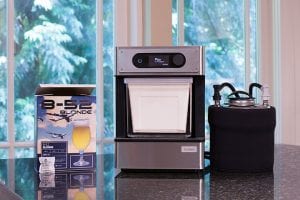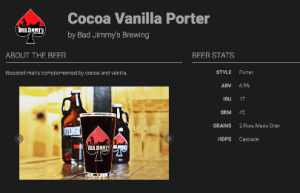 Give someone a glass of artisanal beer and they will drink for an hour. But give them the Pico home brewing system from PicoBrew and they can re-create some of the world’s great beers, or create their own home-crafted ales, for a lifetime.
Give someone a glass of artisanal beer and they will drink for an hour. But give them the Pico home brewing system from PicoBrew and they can re-create some of the world’s great beers, or create their own home-crafted ales, for a lifetime.
What makes the joy of do-it-yourself home beer making with Pico both a rewarding and truly social experience is the ability to collaborate with the best beer makers (and beer drinkers) around the world by sharing recipes and brewing techniques. That’s where the magic of PicoBrew engineering comes in. The process of brewing the perfect craft beer is controlled by a machine programming language known as Beer XML, a grandfather of the HTML code that appears on most Web pages. Brew-it-your-selfers can now track the entire beer making process from a smartphone, tablet or PC with Pico’s Wi-Fi connectivity and Web-based app.
At 12-inches wide, the Pico system brews 5-liter batches of beer in each session. A bit of extra space in your kitchen (and your fridge) is also needed to cool your new brew in the included mini-keg. Pico’s current price on picobrew.com and in brewing supply stores is $799.00. PicoPaks with all the flavorful ingredients run around $15-$25.00.
 As you’re about to discover, Co-founders Bill Mitchell, a Microsoft veteran, and brother Jim Mitchell, a food chemist and physicist, have a rich family tradition for food “inventions.” CTO Avie Geiger, another Microsoft alum, completes the PicoBrew founder’s circle. Annie Johnson is the Master Brewer. Hundreds of investors have supported the company via Kickstarter.
As you’re about to discover, Co-founders Bill Mitchell, a Microsoft veteran, and brother Jim Mitchell, a food chemist and physicist, have a rich family tradition for food “inventions.” CTO Avie Geiger, another Microsoft alum, completes the PicoBrew founder’s circle. Annie Johnson is the Master Brewer. Hundreds of investors have supported the company via Kickstarter.
We tilted back a cold one with the CEO to learn more about what’s brewing with PicoBrew and the “IoB,” or “Internet of Beers.”
Seattle24x7: Ingenuity with food chemistry has deep roots in your family tree. Your grandfather, Dr. William Mitchell, was a famous food chemist. What was it like growing up with the inventor responsible for products like Tang, Cool Whip, Jell-O, and Pop Rocks? Were you a beta “taster?”
Bill Mitchell: My grandfather, Dr. William Mitchell, was the inventor of Pop Rocks and Tang [orange drink], among several other products. He would drive up to our home in Minnesota from New Jersey with his car trunk full of his latest inventions. There were giant bottles of Pop Rocks, which at that time were the size of quarters.
It took General Foods a long time to get comfortable with the notion of Pop Rocks. Of course, Tang went into outer space with the astronauts. For us kids, our grandad’s contributions were perfectly normal.
Seattle24x7: Fast forward to PicoBrew and the new Pico device, your home brewing invention. One of the fascinating things about the beer recipes that drive Pico is that they are based on the markup language known as XML. Coincidentally, Seattle, and later Microsoft, were part of the early ratification of the XML standard. How did you come to apply XML to beer?
Bill Mitchell: Well, you know how “Schemas” are. They keep getting extended. Beer XML actually existed before we entered the fray. It was used by people to exchange recipes between the different types of recipe generation software. I think we are the first to actually take it in and have our equipment actually operate and generate machine actions based on Beer XML. We wanted to do some of the things people never dreamed Beer XML would be good for.
Seattle24x7: Are we talking about things like carbonation or the exact proportions of yeast, hops or barley?
Bill Mitchell: Indeed. Not only that, but some of the machine properties as well. Effectively, Pico is like a CNC maker for beer. The brewing process involves moving between different locations or cavities in the machine, some of which contain grain, some of which contain hops, some of which are repositories for water. Being able to move fluid between different parts of the machine, heat it up to a certain temperature and evacuate it is something that people had not previously been using Beer XML for since no equipment had existed for that purpose.
 Seattle24x7: Also revolutionary is the fact that your product line, including the Zymatic, KegSmarts and Pico machines, have an online interface?
Seattle24x7: Also revolutionary is the fact that your product line, including the Zymatic, KegSmarts and Pico machines, have an online interface?
Bill Mitchell: We believe in “IoT,” or as we like to say, “IoB,” the “Internet of Beer.”
To us, beer is inherently social. Folks who are interested in beer are already online and plugged in. They are looking at ratings, reviews and recommendations. Searching for the types of creations they want to make themselves and consume. It’s a natural confluence when you’re actually making beer on IoT equipment to be able to see all of the steps as you’re brewing and fermenting and then carbonating and actually enjoying the beer. And then being able to share it with everyone.
Seattle24x7: The Internet of Beers? We like it! And you have a Web app?
Bill Mitchell: Yea, right now it’s a Web-based HTML 5 app that you can see on your phone, tablet or desktop PC. So you can startup a batch and take-off. When you come back in a couple of hours or more, you can see where you are in the process. It’s the joy of brewing without the labor.
Seattle24x7: What is PicoBrew’s overarching mission?
Bill Mitchell: Our master plan has always been to get the world brewing. The numbers count up 1.2 million home brewers in North America over the last ten years, but people are constantly churning in and out. The reason people have not been sticking with it is that brewing has been a relatively arduous process. If you’re doing an all-grain batch, it can take 7-8 hours. In the past, it was something you had to babysit.
Traditional home brewing was anything but easy. [Warning: beer tech jargon approaching – Ed.]. It meant doing water extraction at certain temperatures, pulling out sugars from the starches and the grain, boiling with hops, getting an isomerization reaction with alpha acids and beta acids, getting some contributions from hop oils, and then going through the fermentation process. Those steps are all fraught with the potential for error.
Then, after that labor of love, if you came up with a bad batch of beer, it was more than frustrating. Or, once you got a great batch, the repeatability for reproducing it again was almost nil. Home brewers had to keep extensive notebooks to try and duplicate their results.
With Pico, you can produce the best tasting beer you’ve ever had all by yourself. We’ve made the experience akin to an advanced, super automatic, espresso maker or a Nespresso where you can produce reliable, quality results every time.

Seattle24x7: There is no shortage of baristas here in Seattle. The Pico system appears to be creating “Beer-istas!”
Bill Mitchell: You may be surprised to know that making beer is actually a harder challenge than espresso. First, there are more different types of beer than espresso or coffee in general. The number of flavor and taste profiles for beer is amazing. It’s more diverse than wine. With beer, you can get sweet, you can get salty, bitter, sour — there are so many different ranges of aroma and flavor, you can pair it with just about any food.
We asked ourselves, how do we bring “simplicity of process” and the ability to recreate all of these truly great recipes and styles to everyone at the push of a button?
Seattle24x7: An incredible engineering challenge.
Bill Mitchell: When we started, we knew we wouldn’t be able to get there in a single, giant leap — to create a new technology and create a new industry overnight.
At Microsoft, I had the luxury of helping start a number of new businesses. But nobody jumps from concept and new industry to a polished, mass market, affordable product for the kitchen in a single step.
Seattle24x7: You’ve introduced the concept of PicoPaks with the Pico system. This lets customers hand pick recipes and ingredients from craft breweries all over the the world, as well as create their own personal, craft brands, and even offer their own beer packs for sale in your Marketplace?
Bill Mitchell: We created the PicoBrew Developers Program. If you desire to actually participate in that ecosystem, as a craft brewery or as a home brewer, you can produce your own recipes that we will turn into PicoPaks™. We will publish the Paks for you, handle orders and fulfillment, and you get the royalty checks, just like the Apple app store!
We already have around 400 home brewers registered as PDP program members. We have over 100 professional craft breweries as well.
Seattle24x7: Say a craft brewery wanted to market Seattle24x7 CyberAle. How would they market it in the PicoBrew Marketplace?
Bill Mitchell: The marketing of beer dates back to the Prohibition era. Say you are a small craft brewery. You begin as a home brewer, perhaps you started catering weddings and winning awards or home brew contests. and got lots of encouragement. You gain backers, some real estate, some equipment, and you start your own brew pub. The next step is to create your expansion plan, bring in a canning or bottling line, and start serving kegs at different restaurants. Then you want to start expanding beyond your city. That’s where you run into a big block.
The three-tier distribution system for beer is archaic. The protectionism that was designed to help and protect the distributors during Prohibition actually squeezes out today’s little guy. For small brewers to be known outside their local area they actually need to cut deals with the big guys in order to gain distribution or any kind of visibility.
Seattle24x7: Has PicoBrew’s online Marketplace broken through the bottleneck?
Bill Mitchell: One way we help is with the ability to distribute worldwide. Anyone who has a Pico machine anywhere in the world can get a PicoPak. Since PicoPaks are grain and hops and yeast, they are not alcohol and we do not have problems shipping them in the U.S. or worldwide. Users get the benefit of fresh beer without the burden of restricted distribution.
Once a brewer has their recipe, they sign up at our portal, create the box art for their PicoPack, and press Publish. We send out test PicoPaks for you to validate. You brew them on your Pico, ferment them and taste them, and once you approve, you’re live and for sale on the Brew Marketplace. Shoppers have the opportunity to interact with the brewmasters from each of the different breweries represented in the marketplace before they buy, and even suggest changes.
 Seattle24x7: What does an average PicoPak cost?
Seattle24x7: What does an average PicoPak cost?
Bill Mitchell: The costs vary proportionately with the ingredients. For a typical light American lager, something that is akin to a Heineken or Heineken Light, (comparable to a BevMo Mini-Keg), it would be a couple bucks cheaper than that. The range is $15 to “sky’s the limit.” Commonly, PicoPaks would not go for more than $30, but some brewers may want to price rare or exotic ingredients for more. The target batch size is five liters.
Seattle24x7: A Website that deserves credit for bringing the new Pico home brew system from dream to reality is Kickstarter?
Bill Mitchell: We have loved Kickstarter. It has given us an opportunity to connect with customers early on, before we had product availability. It’s more accurate than the level of feedback we used to get in focus groups because these are backers who are putting their money out there. It’s a customer research vehicle, you can get reads on things like price sensitivity, and you can build a loyal audience by taking good care of customers which we bend over backwards to do.
Seattle24x7: Finally, your sales and marketing director’s name is Donald Brewer. Did he change it for the job?
Bill Mitchell: That’s been our standing joke. If you want to join the company you have to change your name. As Donald likes to say, “I’ve been a Brewer my entire life!” [24×7]



















